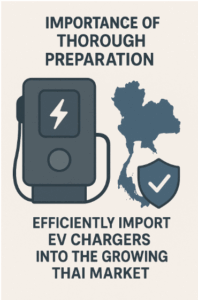The electric vehicle (EV) market in Thailand is expanding rapidly, making it an attractive opportunity to import and distribute EV chargers. However, to ensure smooth operations and regulatory compliance, there are several critical steps you need to take:
1. Obtain Proper Certifications

When importing EV chargers—especially those equipped with wireless communication features like LTE or Wi‑Fi—you must comply with NBTC (National Broadcasting and Telecommunications Commission) standards.
This includes:
- RF (radio-frequency) testing for wireless modules
- Safety tests in accordance with IEC 60950‑1 or IEC 62368‑1
- Electromagnetic field (EMF) testing
Make sure you prepare all necessary documents and follow the specified procedures to meet NBTC requirements.
2. Prepare Detailed Technical Documentation
EV chargers often support multiple connectivity options such as LAN, Wi‑Fi, or LTE. It’s essential to clearly define these technical specifications and connectivity requirements before importing to prevent future misunderstandings or technical issues.

3. Follow Customs Procedures and Prepare Documentation

Importing EV chargers requires adhering to proper customs protocols. The key documents include:
- Import license
- NBTC certification or approval
- Accurate customs declaration forms
By preparing these documents in advance, you can reduce the risk of delays or unexpected obstacles during the import process.
4. Plan Thoroughly and Cover All Bases
Importing EV chargers isn’t just about sourcing products—it also involves understanding detailed legal and technical requirements, especially NBTC standards and Thai customs regulations.
Comprehensive planning and accurate documentation are essential to successfully import and sell EV chargers in Thailand’s rapidly growing market.

